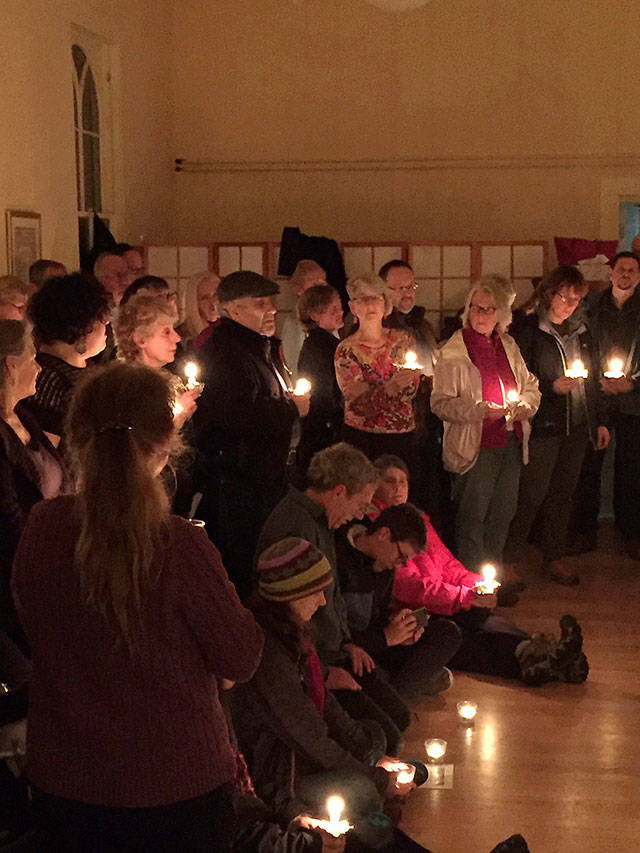As rain fell last Sunday night, Suzanne Greenberg, newly elected president of the Havurah on Vashon, welcomed solemn mourners to a candlelit vigil instead of her new fellow board members to their first scheduled meeting.
“If you brought readings or you want to feel, cry, rage, everything is welcome here,” she said.
Members of the Vashon Havurah and their allies gathered for an evening of grief, prayer and song to honor the 11 worshippers killed by a gunman inside the Tree of Life synagogue in Pittsburgh the day before. The Vashon ceremony began at 7 p.m. and opened with a blowing of the shofar, followed by a chanting of the Mourner’s Kaddish. Yahrzeit candles, burning for 25 hours in accordance with Jewish tradition, were lit in memory of the dead, who were pillars of the Pittsburgh Jewish community.
Those who attended the island vigil were patient and restrained, with so many filing into the building at once that an official headcount could not be determined, though the crowd was substantial, estimated at approximately 100 people.
“What we ask is that you just leave space between what somebody said before you, so that there’s that feeling of honor and respect in silence,” said Greenberg.
She later shared her memory of a conversation with a man at the Western Wall in Israel, which she visited when she was 20 years old. She said they were speaking about being a Jew in the United States and the danger of complacency, adding that at the time she had never doubted her safety as an American Jew, but last Saturday’s attack deeply disturbed her.
“Yesterday when this happened, I immediately thought of that conversation that happened 35 years ago,” she said. “I suddenly felt really scared, I couldn’t fall asleep.”
Greenberg said that the shooting was indicative of an ongoing national emergency now threatening the freedom of all Americans, citing pre-war Germany as a society that did not resist slipping into totalitarianism before ultimately committing genocide against its own people.
“We need to do everything in our power to not let it do that [here], to keep our country as a democracy, as not fascist and not hate filled and terrifying,” she said, invoking those in the room to respond. “Let’s fight this.”
Louise Olsen, a longtime member of the Havurah, asked those who attended to think about a prayer they would write and tuck into the cracks of the Western Wall, a custom in the spirit of Tikkun Olam, a Hebrew principle meaning “to repair the world.” She noted that the Torah study held in the Havurat last week was about Abraham’s hospitality toward strangers, her voice breaking.
“Tonight, we may not know each other’s names, but when I saw all of you come through the doors, I started to cry because it’s so beautiful to have a home for all of us to come to, to be here and to have community,” she said. “You are our community, we are each other’s community, and we thank you from the bottom of our hearts.”
Throughout the vigil, many who spoke made connections between the bitter polarity nationwide and the increasing promulgation of hatred, calling for the general public and elected officials, including President Trump, to hold themselves and their constituents accountable before further prejudice is spread.
Havurah member Chaim Rosemarin read a letter by George Washington written to a Hebrew congregation in Newport, Rhode Island, dated Aug. 21, 1790. The congregation had sent congratulations to the first president upon his election as president one year earlier, and in his reply, he exemplified the new country’s promotion of religious liberty as an inalienable right of the people.
“Happily, the government of the United States, which gives to bigotry no sanction, to persecution no assistance, requires only that they who live under its protection should demean themselves as good citizens in giving it on all occasions their effectual support,” read Rosemarin.
Later, at the suggestion of one mourner, the congregation sang “Ella’s Song,” a justice anthem performed by the group Sweet Honey in the Rock. Written in 1988, the song includes a verse that was emblematic of the feeling in the room at the end of the vigil: “We who believe in freedom cannot rest until it comes.”



